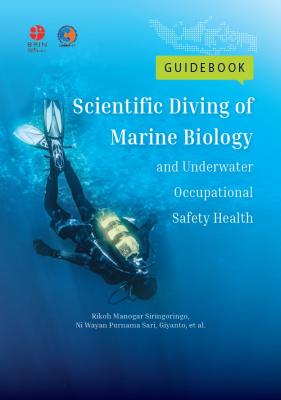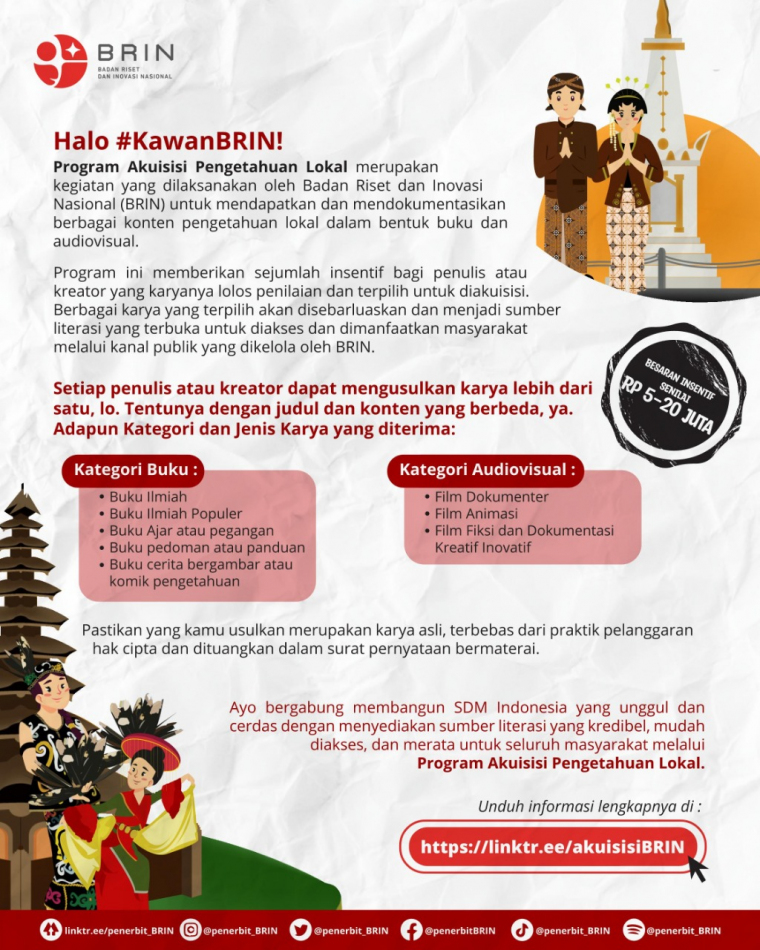Guidebook Scientific Diving of Marine Biology and Underwater Occupational Safety Health
Keywords:
Diving, Scientific Diving, Coral Reef, Biota, IndonesiaSynopsis
Scientific diving has been going on for decades in Indonesia. One of the scientific diving activities is monitoring coral reef ecosystems, better known as the coral reef condition assessment methodology. However, the vastness of Indonesia’s waters is challenging to monitor coral reefs together. Therefore, one coral reef monitoring strategy is creating nodes or regional representation in various regions in Indonesia. Furthermore, strengthening the capacity of human resources through various basic training activities and advanced training. After obtaining a license, this training begins with diving training, followed by coral reef monitoring materials. The fields taught are coral reefs, coral fish, and another benthic biota
Downloads
References
Allen GR, Erdmann MV. (2011). Keragaman Ikan Karang di Perairan Bali, Indonesia, P. 17–71. Dalam Mustika PL, Ratha IMJ, Purwanto S (Eds): Kajian Cepat Kondisi Kelautan Provinsi Bali 2011. RAP Bulletin of Biological Assessment 64. Dinas Perikanan dan Kelautan Provinsi Bali, Balai Riset dan Observasi Kelautan Bali, Universitas Warmadewa, Conservation International Indonesia, Denpasar.
Bohnsack JA, Bannerot SP. (1986). A Stationary Visual Census Technique for Quantitatively Assessing Community Structure of Coral Reef Fishes. NOAA National Marine Fisheries Service, USA.
Bortone SA, Hastings RW, Oglesby JL. (1986). Quantification of Reef Fish Assemblages: A Comparison of Several in Situ Methods. Northeast Gulf Sci 8:1–22.
Brock VE (1954) A Preliminary Report on a Method of Estimating Reef Fish Populations. Journal of Wildlife Management, 18:297–308.
Davis T, Harasti D, Smith SDA. (2014). Compensating for Length Biases in Underwater Visual Census of Fishes Using Stereo Video Measurements. Marine and Freshwater Research. Http://Dx.Doi.Org/10.1071/MF14076
English SA, Wilkinson CR, Baker VJ. (1997). Visual Census of Reef Fish: Long-Term Monitoring of the Great Barrier Reef. Australian Institute of Marine Science, Townsville.
Haddock, Steven, H, D. And Heine, John, H. (2005). Scientific Blue-Water Diving. California Sea Grant College Program. California.
Harvey E, Fletcher D, Shortis M, Kendrick G. (2004). A Comparison of Underwater Visual Distance Estimates Made by SCUBA Divers and a Stereo-Video System: Implications for Underwater Visual Census of Reef Fish Abundance. Mar Freshwat Res 55:573–580.
Howell, R. S., Criscitelli, T., Woods, J. S., Gillette, B. M., & Gorenstein, S. (2018). Hyperbaric Oxygen Therapy: Indications, Contraindications, and Use at a Tertiary Care Center: 1.3 Www.Aornjournal.Org/Content/Cme. AORN Journal, 107(4), 442–453. Https://Doi.Org/10.1002/Aorn.12097.
Jones R, Thompson M. (1978). Comparison of Florida Reef Fish Assemblages Using a Rapid Visual Technique. Bulletin of Marine Science, 28:159–172.
Jonker MJ, Bray PE, Johns KA, Osborne KO. (2020). Surveys of Benthic Reef Communities Using Underwater Digital Photography and Counts of Juvenile Corals. Long Term Monitoring of the Great Barrier Reef - Standard Operational Procedure Number 10, 2nd Ed. Australian Institute of Marine Science, Townsville, Australia. 36 Pp. Https://Doi.Org/10.25845/Jjzj-0v14.
Madduppa, H.H., Subhan, B., Suparyani, E., Siregar, A.M., Arafat, D., Tarigan, S.A., Alimuddin, D.K., Rahmawati, F. & Bramandito, A. (2013). Dynamics of Fish Diversity Across an Environmental Gradient in the Seribu Islands Reefs off Jakarta. Biodiversitas, 14(1), Pp.17-24.
Naval Sea Systems Command. (2016). U.S. Navy Diving Manual. Revision 7. Publication SS521-AG-PRO-010. Washington DC.
Obura, D. and G. Grimsditch. (2009). Resilience Assessment of Coral Reefs : Rapid Assessment Protocol for Coral Reefs, Focusing on Coral Bleaching and Thermal Stress. IUCN. Gland. Switzerland. 70 Pp.
Pais MP, Cabral HN. (2018). Effect of Underwater Visual Survey Methodology on Bias and Precision of Fish Counts: A Simulation Approach. Peerj, 6: 1–19.
Pardo, A. (2014). A Scuba Diving Direct Sediment Sampling Methodology on Benthic Transects in Glacial Lakes: Procedure Description, Safety Measures, and Tests Results. Environ Sci Pollut Res 21, 12457–12471. Https://Doi.Org/10.1007/S11356-014-3011-8.
R. Wartenberg & A. J. Booth. 2014. Video Transects are the Most Appropriate Underwater Visual Census Method for Surveying High-Latitude Coral Reef Fishes in The Southwestern Indian Ocean. Mar Biodiv. DOI 10.1007/S12526-014-0262-Z
SKKNI Penyelaman Ilmiah Biologi Laut. Kemenaker. (2019).
Subhan B., Khair M, Madduppa H, Nurjaya IW, Ardiwijaya RL, Prabuning D, Anggoro AW, Arafat D. (2015). Terumbu Karang Tulamben. Bogor, IPB Press 170 Pp.
Suharsono dan Sumadhiharga OK. (2014). Panduan Monitoring Kesehatan Terumbu Karang: Terumbu Karang, Ikan Karang, Megabenthos dan Penulisan Laporan. Pusat Penelitian Oseanografi LIPI, Jakarta
Tessier A., Pastor J., Francour P., Saragoni G., Crec’hriou R., & Lenfant P. (2013). Video Transects as a Complement to Underwater Visual Census to Study Reserve Effect on Fish Assemblages. Aquatic Biology. Vol. 18: 229–241, 2013. DOI 10.3354/Ab00506.
Van Liew, H. D., & Flynn, E. T. (2005). Direct Ascent From Air and N2-O2 Saturation Dives in Humans: DCS Risk and Evidence of a Threshold. Undersea & Hyperbaric Medicine : Journal of the Undersea and Hyperbaric Medical Society, Inc, 32(6), 409–419.

Downloads
Published
Categories
License

This work is licensed under a Creative Commons Attribution-NonCommercial-ShareAlike 4.0 International License.






























